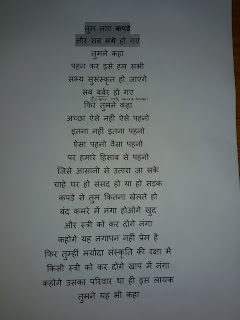My views about "Essay on Dramatic Poessy" by Dryden
What is Tragedy?
Let's see two great writer's definition of tragedy.
Aristotle’s Definition of Tragedy
Dryden’s Definition of Play
· Aristotle says that Tragedy is an imitation of an action while Dryden says that Play is a lively image of human nature.
· According to Aristotle pity and fear are used in tragedy to purify the emotions of mankind. Whereas Dryden says that passions and humors are used to delight and instruct mankind.
· Aristotle says that in tragedy, there is an ornamental language is used and in different parts of a tragedy story goes on in a form of action not by narration.
We can find these differences in both definitions of Aristotle and Dryden. We find much clarity in Aristotle’s definition.
Ancients vs. Moderns
Ancients and Moderns are critical topics to discuss upon. Ancients
have discovered rules and regulations of writing play after so much
trouble. If one starts something then only another could give his/her
views on that thing. If Ancients hadn’t written anything about plays
then I am sure we couldn’t separate story, play, essay or poem in its
particular type. So we should be thankful to the Ancients.
Beside Ancients, Moderns are also doing their best because they are not following blindly the rules and wherever they find that changes are necessary they do it. And the new form of play we got. So I would not be in anyone’s side but with the right one.
In the essay of
Dryden he has used four characters who one by one favours Ancients,
English plays, French plays and at last Dryden through Neander’s mouth
favours English drama, moderns and use of rhyme in the play.
Third character Lisideius favours French drama with following points:
Third character Lisideius favours French drama with following points:
· He argues that French drama has followed three unities perfectly.
· French tragedies based upon some well-known stories.
· They have only one plot.
· Main character is given more attention but other characters are not neglected.
· Their narrations are better managed. They don’t add new theme between the play.
· They avoid bloodshed, murder or duel on the stage.
· Change in the character are not all of a sudden but psychologically narrated.
· Entrance and Exit of characters are natural and logical.
· Better use of rhyme.
I
am not totally agree with Lisideius’ views. Some points are right but
where I differ is firstly the point of plots. If the story has only one
main plot then it will be difficult to see what is important in the
play. Another point is whether murder, duel or bloodshed should be shown
or not on the stage; I think that it’s not unnatural to show all these
on stage. Because it’s not apart from our daily life. All other points
are appropriate as per my thinking.
Play is lively image
of human nature. And we are not normally habituated to speak in rhyme.
Comedies could be in rhyme but if we use rhyme in serious plays also
then there is possibility that the seriousness of the play will
disappear.
But after all its choice of words in a natural order that makes language natural, whether it is rhyme or verse. Rhyme has justified its universal use. Poetic language gives pleasure. And the primary function of poetry is to give delight. So the dialogues of the play should be a mixture of both prosaic and poetic language so that intellectual and normal audience could enjoy.





Comments
Post a Comment